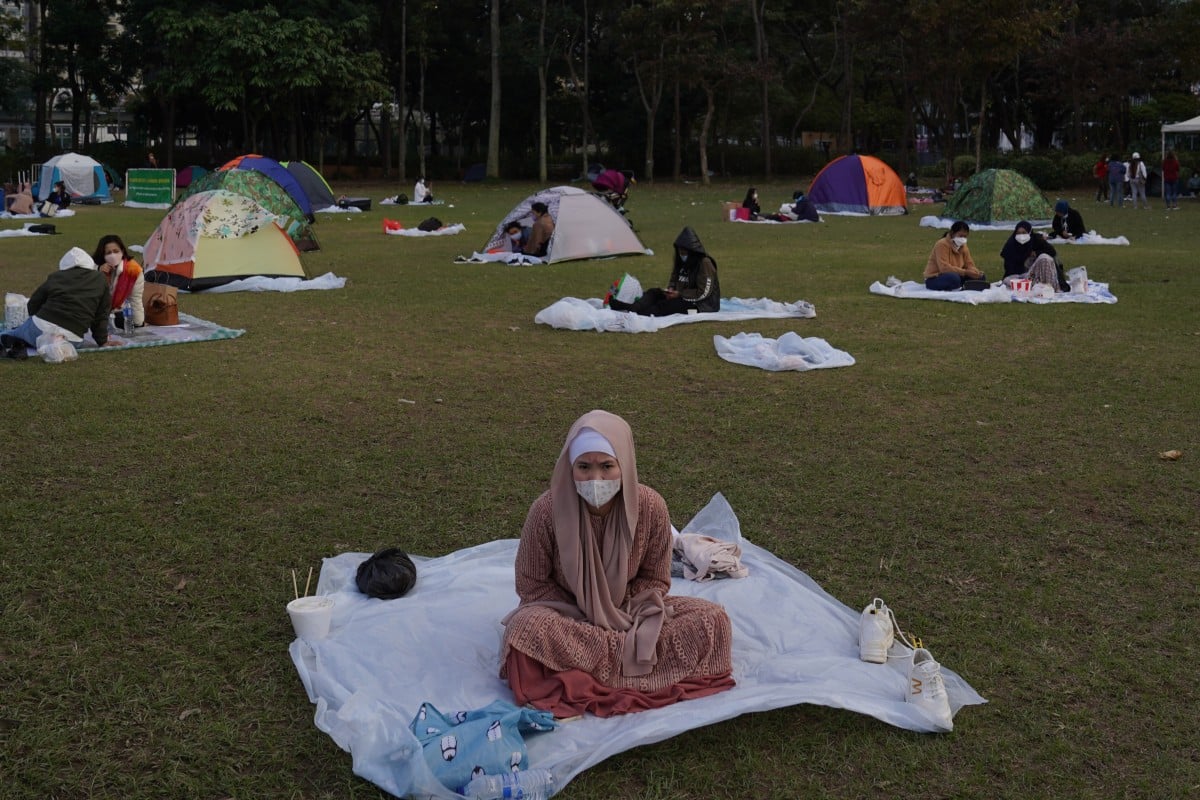
Face off: Should Hong Kong domestic workers be entitled to the city’s consumer vouchers?
- Two students discuss how domestic helpers are not eligible to be permanent residents, and whether that should allow them to receive the e-vouchers
- Each week, two of our readers debate a hot topic in a showdown that does not necessarily reflect their personal viewpoints
 Many of Hong Kong’s domestic workers have faced much heavier workloads and discrimination amid the pandemic. Photo: Sam Tsang
Many of Hong Kong’s domestic workers have faced much heavier workloads and discrimination amid the pandemic. Photo: Sam TsangFor: Chloe Kwok, 14, Heep Yunn School
Did you watch the viral video of a domestic worker talking about her life in Hong Kong? In the clip, the Indonesian helper highlights the discrimination faced by the city’s domestic workers.
She explains that they all wish to be “treated better, cared for and seen as a part of the employer’s family”.
But unfortunately, many of them are being treated unfairly, including by the government.
Hot topics: Hong Kong freezes domestic worker wages for second straight year
For example, the city’s 340,000-strong workforce of foreign domestic helpers is not eligible for the new round of HK$10,000 consumption vouchers which were introduced to help residents survive the pandemic-induced economic downturn.
Permanent residents and new immigrants to Hong Kong who are aged 18 or above will receive the spending coupons. Many domestic helpers who have lived in Hong Kong longer than some permanent residents have been excluded from the voucher programme.
Some helpers have worked in the city for decades, cleaning their employers’ homes and looking after their children. Few people have suffered more during Hong Kong’s pandemic restrictions than the hundreds of thousands of women who work as domestic helpers.
Dozens of workers who tested positive for Covid-19 have been fired by their employers while many others have had to find a shelter to serve their home quarantine. Some slept on the streets or in parks. Domestic workers wouldn’t have used the handout for entertainment or fancy clothes; they need money to simply survive.
Their exclusion is a form of discrimination that could diminish Hong Kong’s status as an inclusive city. If the government does not address their financial and emotional needs, they may consider working in other places such as Singapore and Taiwan.
Poor local residents need financial assistance from the government to survive, and this includes the city’s domestic workers. Therefore, they should be entitled to the HK$10,000 consumption vouchers.
Your Voice: Domestic workers deserve pay rise (short letters)
Against: Cherry Chan, 12, St Mary’s Canossian College
To encourage spending and support affected businesses, the government is providing consumption vouchers worth HK$10,000, which will be distributed in two instalments of HK$5,000.
The first HK$5,000 will be given out this month to the 6.3 million people who had registered in the last round of the scheme and to new applicants, while the rest will come in mid-2022.
Domestic workers – who are not permanent residents – are not entitled to these coupons. This has caused controversy, but I don’t see what the fuss is all about.
Helpers are vital to the city’s socio-economic well-being and must play by the same rules, being subject to compulsory universal testing and HK$10,000 fines for breaking social-distancing laws.
But there is a deeper issue here: they are not eligible for permanent residency, even if they have stayed in Hong Kong for seven years without interruption, the length of time other foreigners must live in the city to be eligible for right of abode.
In 2013, five judges of the Court of Final Appeal ruled unanimously that domestic helpers would not be allowed to settle permanently in Hong Kong.
They usually do not earn enough to pay any tax. The consumer vouchers comprise part of the residents’ hard-earned money, so the handout is a kind of social welfare payment. On the other hand, most domestic workers keep their earnings without paying taxes, so they should not be allowed to claim this benefit.
Hot Topics: Domestic workers left out in the cold, nowhere to go
Also, the two rounds of the voucher scheme cost the government more than HK$100 billion. This is a huge amount, and the money should be spent wisely because the future is uncertain.
We don’t know how long the pandemic will last, and people may need more financial assistance. Thousands of Hongkongers have lost their jobs over the past two years and are struggling to make a living. They also need help.
Domestic helpers are reaping the fruits of their labour and should not be eligible for the consumption vouchers.
